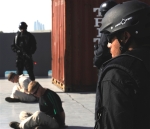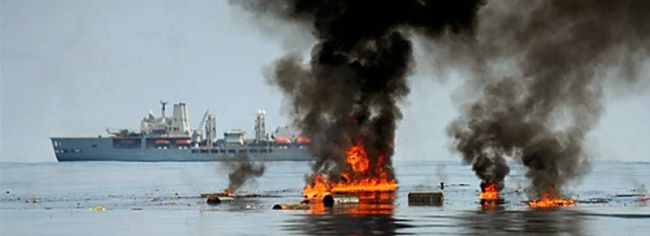Exercise Aims to Combat Weapons of Mass Destruction
Special to American Forces Press Service
WASHINGTON, Jan. 29, 2010 — International cooperation is key to interrupting the trafficking of materials used to make weapons of mass destruction and stopping the proliferation of nuclear arms, a Department of Homeland Security official said.
Mike Perron, program manager of intelligence and operations coordination for the Department of Homeland Security, described the aim of a recent multinational exercise called Leading Edge 2010 during a “DoDLive” bloggers roundtable yesterday.
Perron was one of many U.S. government interagency participants involved in the U.S. Central Command-hosted exercise, held in Abu Dhabi, United Arab Emirates. More than 30 nations sent representatives to share ideas and gain knowledge on methods for combating weapons of mass destruction.
The exercise was important, Perron noted, because it takes an interagency approach — including customs and law enforcement — to be successful.
The three-day, table-top exercise included three phases. The first phase centered on visit, board, search and seizure interdiction missions, in which the U.S. Coast Guard Middle East Training Team provided training to boarding teams from other participating countries. An operational level phase was based at the port in Mina Zayed, and covered issues of customs, law enforcement and other security issues. This phase included static displays and live demonstrations. Next, was a strategic table top where questions about post interdiction issues were discussed with subject matter experts.
Leading Edge is one of more than 35 exercises that began with the introduction of the Proliferation Security Initiative, an international agreement created in 2003 under former President George W. Bush’s administration.
This year’s Leading Edge exercise, which concluded yesterday, elicited positive reactions from participants.
“I feel like this exercise demonstrated a lot of interagency and international cooperation,” Navy Cmdr. Tony Crego, of the joint staff strategic plans and policy directorate in the Combating WMD Division, said during the roundtable. “It sends a message to the proliferators that there’s a global network of nations, agencies and organizations that are committed to stopping proliferation around the globe,” he added.
Peron said he has seen the Proliferation Security Initiative evolve. “I’ve seen a great deal of evolution both in terms of the numbers, now up to 95 PSI-partnered countries, as well as with the interagency participation.”
Although this year’s scenario concentrated on a maritime example, future exercises are slated to focus on aerial and ground transport systems.
(Navy Petty Officer 1st Class Molly A. Burgess works in the Defense Media Activity’s emerging media directorate.)
Source:
U.S. Department of Defense
Office of the Assistant Secretary of Defense (Public Affairs)

 von
von 

